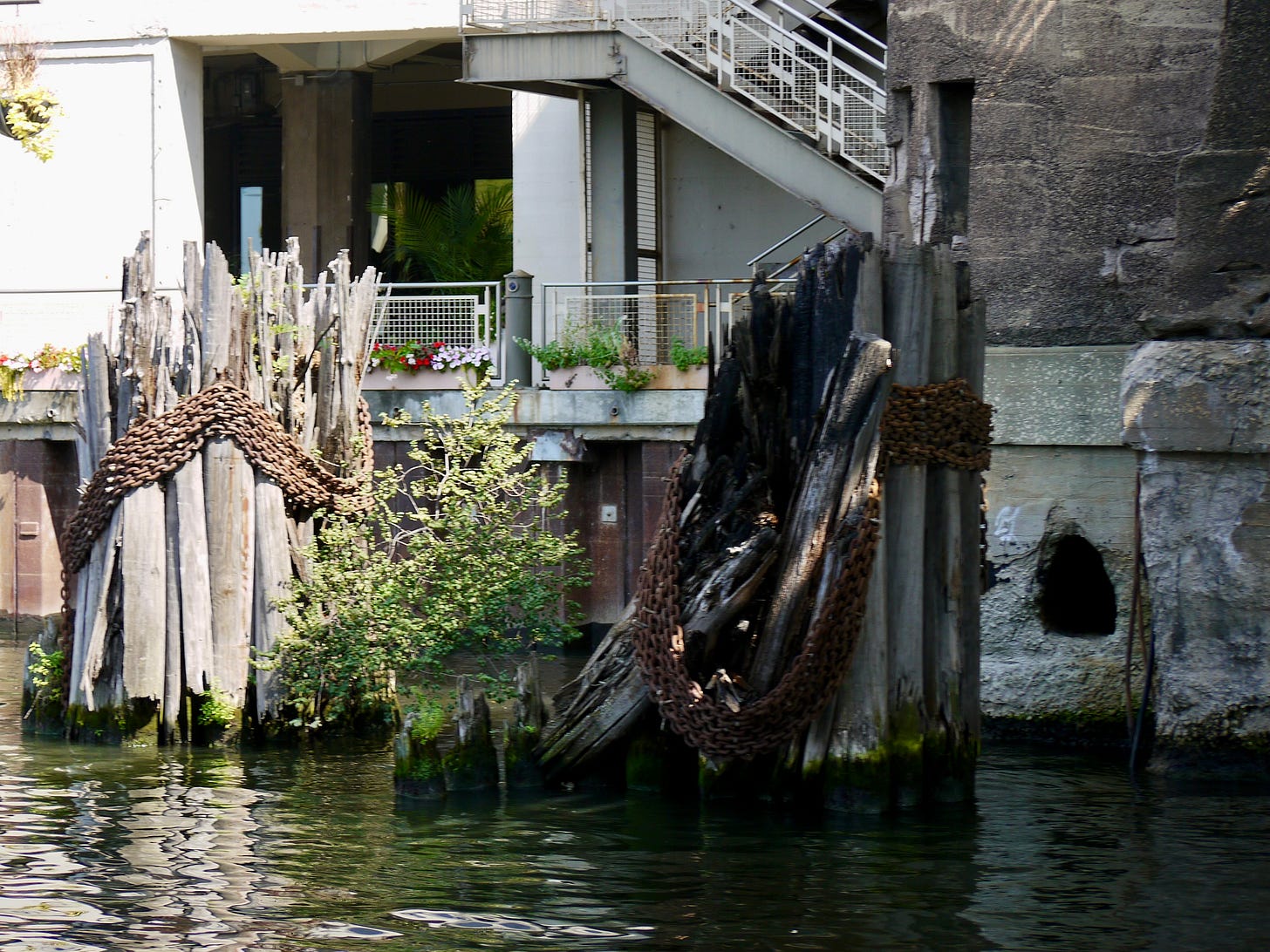My monstrous innocence
Political risk and the dark night of my conscience
We live in communities and grow to critique them, sensitive to the fact that they have helped to form us. I think this growth and discernment, in or sometimes outside of our communities, is demanding. In fact, in cases where this work is most important, it could call for a conversion of sorts.
Over the past few years, I've had to look hard at the kind of communities I've been attracted to and what I've gotten out of my role in them.
I left one community because I had grown enough to learn that I had an essentially codependent relationship with key community members. Something in me enjoyed—needed, even—the role of "hero child," a dysfunctional family member type characterized by an overgrown sense of duty and specializing in making up for others' shortcomings.1 This community allowed my hero child to run wild. But I learned that I wasn't accepted in that community if I took steps to move away from my hero-child identity. That's when I left.
I didn't grow up in an alcoholic home, but I had enough alcoholism in my family tree for it to have affected me.
I've come understand other, more political disorders similarly. I didn't grow up in a slaveholding home, for instance, but I have enough white supremacist thinking in my family tree—and in my society—for it to have affected me.
A couple of weeks after leaving this community, I woke up in the middle of the night with a sudden, tremendous guilt. I’ve understood it since as a three-alarm dark night of my conscience. In leaving my community, my conscience was telling me, I had failed the community. Hero children, of course, are quite motivated by the possibility of guilt because we build our identity around loyalty to the group. Many other people do this, too. They do it whether that group is a family, a club, a chapter, a church, a team, a town, a corporation, or a profession.
Or even an ideology or a political party—or a nation-state. We may not meet regularly with party members. We may not attend party caucuses or conventions. But perhaps some of the glue that keeps an important group of our friends together is a common political affiliation or ideology. Or perhaps, for some of us, our assessment of our country—an imagined community, after all, as Benedict Anderson points out—is changing.2 I think I've matured and exercised some discernment, for instance, since fourth grade when I puzzled over the claim in our class’s history textbook, co-authored by my aunt, that Virginia's African-American slaves were happy and carefree.
That dark night I remembered Paul Tillich, the American philosopher and theologian whose work was profound enough and accessible enough to land him on the cover of Time in 1959. I read and reread a section of his essay "Moralisms and Morality" called "Moralisms of Authority and Morality of Risk." Tillich reminded me that our conscience "calls us to what we essentially are, but it does not tell with certainty what that is." It's best not to follow one's conscience, Tillich says, when the authority one's conscience itself follows is split.3 My conscience was split badly that night between an external authority, which had been my orientation for decades, and a new, internal authority that I hardly credited or even understood.
I think this split in authority made my conscience's call to me that night particularly strong. My conscience became not my guide, really, but my threshold guardian. I would need to work with and against that guardian and pass it to get to where it was pointing—to who I essentially am.
At the same time I realized, reading Tillich, that something integral to my sense of identity was clinging to what Tillich calls the "state of innocence." Throughout my life, I partnered with my external authorities to protect my innocence, which had been gradually degenerating since childhood. In this situation, Tillich's Christian existentialism was just what I needed:
. . . every moral act involves a risk. The human situation itself is such a risk. In order to become human, man must trespass the "state of innocence," but when he has trespassed it he finds himself in a state of self-contradiction. . . . A morality which plays safe, by subjecting itself to an unconditional authority, is suspect. It has not the courage to take guilt and tragedy upon itself. True morality takes guilt and tragedy upon itself. True morality is a morality of risk.4
By leaving the group that could only reinforce an unhealthy part of my self-identity, I was taking on "guilt and tragedy." But I also was developing, in Tillich's famous phrase, the "courage to be," which he calls
. . . the dynamic self-affirmation of man as man. This self-affirmation must take the threat of non-being, death, guilt and meaninglessness to itself. It risks itself, and through the courage of risking itself, it wins itself.5
One doesn't have to leave a community, of course, to move away from a rotting state of innocence. In fact, one may leave a community or join one precisely in order to maintain that innocence. Leaving and joining aside, the main concern in Tillich's essay is how one develops "the courage to be." To develop it, he says, one moves from what he calls moralisms, which allow us to base our identity on an external authority's notion of right and wrong, to morality, which is "the self-affirmation of our essential being."6
Since this dark night of my conscience, my involvement in communities has become healthier. These communities have led me to new experiences that I wouldn't have allowed myself to choose because of my mistaken need for innocence. In my old age, I have finally sought out many new acquaintances who are not of my tribes. It's fun.
Most people have not moved, in Tillich's sense, from moralisms to morality. Many who haven't are minors, and their innocence is healthy. Many others who haven't are young adults, and their innocence is sometimes regrettable. Many others who haven't are older, and their innocence is often dangerous, as mine was.
How can innocence be dangerous? Innocence protects an identity that society has constructed for me. I cooperate with society—and with groups I join in our society—by submitting to moralisms. In other words, I behave. As long as my personal behavior is good, I can ignore my calling to public life, a calling that rejects moralisms but requires morality.
If my behavior is the apex of my Christian faith, then I can watch passively—perhaps approvingly, perhaps critically, but passively is the point—as those to whom I've ceded the public world work to destroy that world. I can flee immorality as the federal and state governments roll back civil rights gains and publish new textbooks that come closer to my aunt's false view of the past. I can open the door for ladies as the administration destroys the families of my immigrant neighbors. But by accepting the bargain—my socially constructed self-identity in exchange for an unjust society—I am complicit. James Baldwin's maxim applies to me: ". . . anyone who insists on remaining in a state of innocence long after that innocence is dead turns himself into a monster."7
"Monster" isn't hyperbole, or at least it wasn't in my case. I hurt people. I had to apologize to them for how I failed to act when, for the sake of my identity, I insisted on keeping my innocence. (Of course, I didn’t use such Tillichian phrasing, but I apologized.)
Reading Tillich on moralisms and morality puts me in mind of another existentialist, Simone de Beauvoir, whose life in occupied Paris during World War II made plain the connection between moralisms and violence:
One necessary adjustment was learning to put up with the idiotic and moralistic homilies emanating every day from the collaborationist government—reminders to respect God, to honour the principle of the family, to follow traditional virtues. It took [Beauvoir] back to the "bourgeois" talk she had so hated in her childhood, but this time backed by a threat of violence. Ah—but perhaps such talk was always backed by hidden threats of violence?8
One thinks also of Baldwin's letter to his then-fifteen-year-old nephew, advising him on how to live in a moralistic America among innocent whites:
You must accept [whites] and accept them with love. For these innocent people have no other hope. They are, in effect, still trapped in a history which they do not understand; and until they understand it, they cannot be released from it. They have had to believe for many years, and for innumerable reasons, that black men are inferior to white men. Many of them, indeed, know better, but, as you will discover, people find it very difficult to act on what they know. To act is to be committed, and to be committed is to be in danger. In this case, the danger, in the minds of most white Americans, is the loss of their identity.9
When reality confronts identity, the only way out is to act. But, as Baldwin notes, few do so. To protect their innocence, most people will come back into the fold during their dark night of conscience. It’s safer to behave than to act.10
We have no record of Jesus behaving. In the Gospels, he is always speaking or acting, which are, as Hannah Arendt points out, the two hallmarks of public life.11 We can assume that Jesus generally behaved, something most people learn how to do during the innocence of childhood. But the Gospels are decidedly not about behavior. They are decidedly about public life.
Above photos are of downtown Chicago in September 2024. The short footnotes below refer to full citations in the manuscript’s and this Substack’s bibliography.
One good book describing the four types of children in an alcoholic home is Sharon Wegscheider-Cruse, Another Chance: Hope and Health for the Alcoholic Family, 2nd ed (Palo Alto, Calif: Science and Behavior Books, 1989).
Anderson, Imagined Communities.
Tillich, Theology of Culture, 138-39.
Tillich, 140-41.
Tillich, 141.
Tillich, 136.
Notes of a Native Son, in Collected Essays, by James Baldwin, The Library of America 98 (New York: Library of America, 1998), 128-29.
Bakewell, At the Existentialist Café, 140-41. Italics in the original.
The Fire Next Time, in Collected Essays, by James Baldwin, The Library of America 98 (New York: Library of America, 1998), 293-94.
Hannah Arendt introduced me to this distinction between behavior and action. Society’s modern victory over the political in the public realm (i.e., society’s making economic matters the concern of the public realm), she says, substituted “behavior for action.” Arendt, Human Condition, 38-45. As society grows in population, it is “less likely to tolerate non-behavior." Further, “. . . deeds will have less and less chance to stem the tide of behavior . . .” Arendt, 43.
Arendt, 176. Arendt believes that Jesus’s “insights into this faculty [of action] can be compared in their originality and unprecedentedness with Socrates’ insight into the possibilities of thought . . .” Arendt, 246-47. See also Arendt, 318.







I was looking for the "perfection" post and came here instead, so I re-read it and appreciated much of what you say here. The Tillich quotes are especially good. I understand and have been in the position of being unaccepted by others when I stopped playing a particular role they had come to expect.
We all need to figure out where the "authority" for our lives needs to come from - what is authentic, what is truly ourselves and the living out of who we are meant to be? It can be very complicated when one is in longterm relationships with expectations, manipulations, and guilt -- as well as love, which makes us not want to disappoint the others who we care for deeply.
Thank you for this. Bringing in Tillich adds weight, explaining why certain forms of “innocence” remain so durable: one involves risk; the other, safety—echoing in political life: staying quiet can be mistaken for moral clarity, and doing the expected passes for doing what’s right.
You bring to mind Graham Greene. Using the language of his day: “Innocence always calls mutely for protection when we would be so much wiser to guard ourselves against it: innocence is like a dumb leper who has lost his bell, wandering the world, meaning no harm.” —The Quiet American.